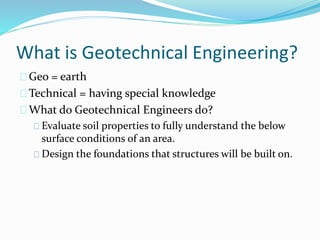Getting The Geotheta To Work
Getting The Geotheta To Work
Blog Article
Geotheta Can Be Fun For Anyone
Table of ContentsGeotheta Fundamentals ExplainedExcitement About GeothetaGeotheta Things To Know Before You Buy3 Easy Facts About Geotheta ExplainedSome Of Geotheta

They carry out website examinations, collect examples, perform research laboratory examinations, and analyze data to evaluate the suitability of the ground for building projects - Consulting Engineers. Based upon their findings, geotechnical engineers give referrals for structure style, incline stability, keeping structures, and reduction of geotechnical dangers. They team up with various other professionals, such as architects, architectural engineers, and building teams, to ensure that geotechnical factors to consider are integrated right into the total task layout and execution
By evaluating the behavior and buildings of dirt and rock, they can determine potential geotechnical threats such as landslides, dirt settlement, or incline instability. Their proficiency helps protect against failures or accidents that might endanger lives and residential property. Below are some in-depth tasks and duties of a geotechnical designer: Site Examination: Geotechnical designers conduct site investigations to collect information on subsurface conditions.
They translate the information to understand the homes and habits of the soil and rock, including their stamina, permeability, compaction characteristics, and groundwater problems. Geotechnical Analysis and Style: Geotechnical engineers examine the data collected throughout website examinations to analyze the security and suitability of the site for construction jobs. They perform geotechnical estimations and modeling to assess aspects such as birthing capability, settlement, slope stability, lateral planet pressures, and groundwater circulation.
6 Easy Facts About Geotheta Explained
Foundation Design: Geotechnical engineers play a crucial function in creating foundations that can securely support the designated structure. They assess the soil conditions and lots demands to identify the proper structure kind, such as superficial structures (e.g., grounds), deep structures (e.g (https://filesharingtalk.com/members/599923-geotheta)., piles), or specialized methods like dirt improvement. They consider variables such as negotiation limits, birthing capacity, and soil-structure interaction to establish ideal foundation layouts
They evaluate construction strategies, monitor site tasks, and conduct field inspections to verify that the design suggestions are adhered to. If unpredicted geotechnical issues occur, they assess the circumstance and give referrals for remediation or changes to the design. Risk Evaluation and Mitigation: Geotechnical engineers examine geotechnical risks and dangers connected with the job website, such as landslides, liquefaction, or soil disintegration.

Partnership and Interaction: Geotechnical engineers function closely with other experts associated with a task, such as engineers, structural engineers, and building and construction teams. Reliable interaction and collaboration are important to incorporate go to this web-site geotechnical factors to consider right into the total task style and construction procedure. Geotechnical designers supply technical knowledge, solution questions, and ensure that geotechnical needs are met.
Geotheta Things To Know Before You Get This
Here are some sorts of geotechnical engineers: Foundation Engineer: Structure designers focus on making and analyzing structures for structures. They examine the dirt problems, load demands, and site characteristics to determine the most proper foundation kind and design, such as superficial foundations, deep structures, or specialized techniques like stack structures.
They evaluate the factors influencing incline security, such as soil buildings, groundwater problems, and slope geometry, and develop approaches to avoid incline failures and minimize threats. Quake Engineer: Earthquake engineers focus on analyzing and making structures to endure seismic forces. They evaluate the seismic hazard of a site, assess soil liquefaction possibility, and create seismic design requirements to guarantee the safety and durability of frameworks throughout quakes.
They carry out area screening, accumulate examples, and assess the accumulated data to identify the soil properties, geologic formations, and groundwater problems at a website. Geotechnical Instrumentation Engineer: Geotechnical instrumentation designers focus on tracking and gauging the habits of dirt, rock, and frameworks. They mount and keep instrumentation systems that check aspects such as dirt negotiation, groundwater degrees, incline movements, and structural displacements to analyze efficiency and give very early cautions of prospective issues.
The Best Guide To Geotheta
They perform examinations such as triaxial examinations, loan consolidation examinations, straight shear tests, and permeability examinations to collect data for geotechnical evaluation and design. Geosynthetics Engineer: Geosynthetics designers specialize in the design and application of geosynthetic materials, such as geotextiles, geogrids, and geomembranes. They make use of these materials to boost soil security, reinforce inclines, provide drainage services, and control erosion.
They have a tendency to be investigatory individuals, which suggests they're intellectual, introspective, and analytical. They wonder, systematic, logical, logical, and sensible. A few of them are likewise social, meaning they're kind, charitable, cooperative, person, caring, useful, understanding, skillful, and friendly. Does this seem like you? Take our complimentary job examination to discover out if geotechnical designer is one of your top profession suits.
In the workplace environment, geotechnical designers utilize specialized software application tools to carry out estimations, produce designs, and examine data. They prepare records, evaluation job specs, interact with customers and staff member, and coordinate job activities. The office setup gives a favorable atmosphere for research study, analysis, and collaboration with various other professionals associated with the task.
Geotheta Fundamentals Explained
They frequently visit task sites to carry out site investigations, assess geotechnical conditions, and collect data for evaluation. These gos to include taking a trip to different areas, sometimes in remote or tough terrains. Geotechnical designers may perform soil tasting, conduct examinations, and screen building and construction activities to guarantee that the geotechnical elements of the task are being carried out correctly.
Geotechnical designers also function in specialized geotechnical research laboratories. Geotechnical research laboratory engineers work extensively in these environments, taking care of testing tools, operating tools, and taping data.
Report this page